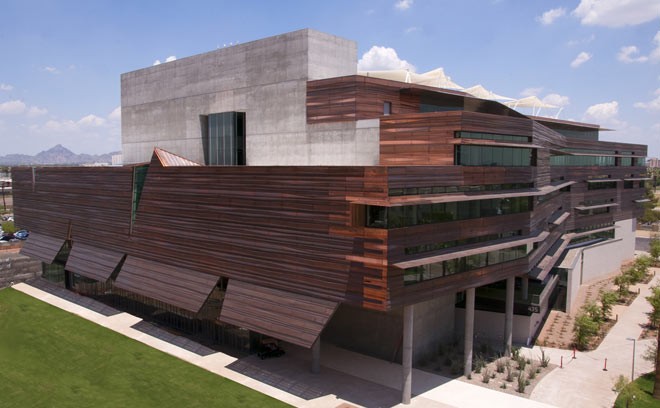
Northern Arizona University received praise this week from the Arizona Board of Regents for focusing on undergraduate education, expanding accessibility to degrees that feed highly critical job sectors and continuing to adapt through the use of technology as higher education evolves.
NAU President John Haeger delivered a presentation during the ABOR meeting at the High Country Conference Center that outlined a business plan for the university to achieve its 2020 goals.
“This type of institution has a culture all its own,” Haeger said about NAU. “And it’s not a culture of a research drive. It’s the culture of an institution where undergraduate education drives everything.”
Regent Jay Heiler commended NAU for its “wise” decision to focus on undergraduate education, calling it a “true value added for Arizona” and a “market differentiator” that has been successfully executed by the university.
“Even though I realize that all of our institutions strive for excellence in undergraduate education and dedicate tremendous energies to that, I’m personally proud that one of our three schools has chosen to make that such a strategic focus,” Heiler said. “I think it was a good thing, not only for the institution but also for the state.”
Haeger noted the university’s first-time full-time freshman retention rate for the 2011 cohort climbed to 76 percent with the launch of programs like the First-Year Learning Initiative and the Lumberjack Mathematics Center. The data on the 2011 cohort is the most current information available through IPEDS.
The president said NAU may expand its signature programs, including health care professions at the Phoenix Biomedical Campus, to other areas in the state including Yuma and Prescott Valley. In meetings with Yavapai College and with Prescott Valley officials, he was told, “If you bring those signature programs to us we’ll provide the space. These communities are really desperate for health care professionals.”
Haeger also emphasized the partnerships and online programs such as 2NAU and Personalized Learning that provide low-cost pathways to degrees.
“We have produced in the past six or seven years enormous numbers of choices for Arizona students,” he said.
Enrollment in STEM fields has increased by 49 percent since 2008, as has the number of STEM degrees awarded over the same time period. Haeger said expansion of science and research space, investment in faculty and staff salaries, continuing innovation in online education and completing deferred maintenance projects are high priorities.
Part of the deferred maintenance projects approved in the Capital Improvement Plan include $60 million in infrastructure upgrades to fire safety systems and campus accessibility responsive to code compliance. The university also received the green light to move forward with plans for a facility that would replace the aging Wall Aquatic Center and add tennis courts for the men’s and women’s tennis teams.
A new Student and Academic Services building, a project to be constructed through a public-private partnership, will provide a permanent home to the Lumberjack Mathematics Center, additional faculty offices and space for several student support departments.
The building projects require approval by the Arizona Legislature’s Joint Committee on Capital Review.
The board also approved guidelines for conducting a presidential search that will begin in January. Haeger’s contract ends July 1, 2015, and the board will issue a request for proposals early next year to hire a consultant to conduct the search.
Board president Eileen Klein discussed creation of a task force to formulate best practices for educating students on campus safety. University leaders, public safety officers and student organizations will be called upon to participate in the effort.
The next board meeting is scheduled for Nov. 21-22 at the University of Arizona in Tucson.



